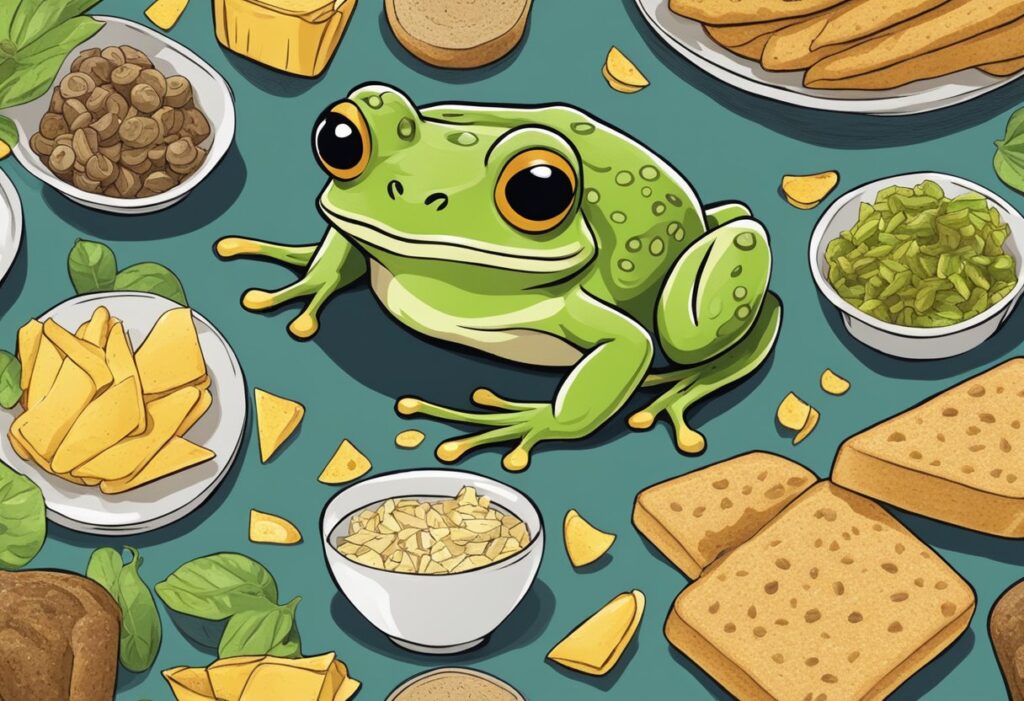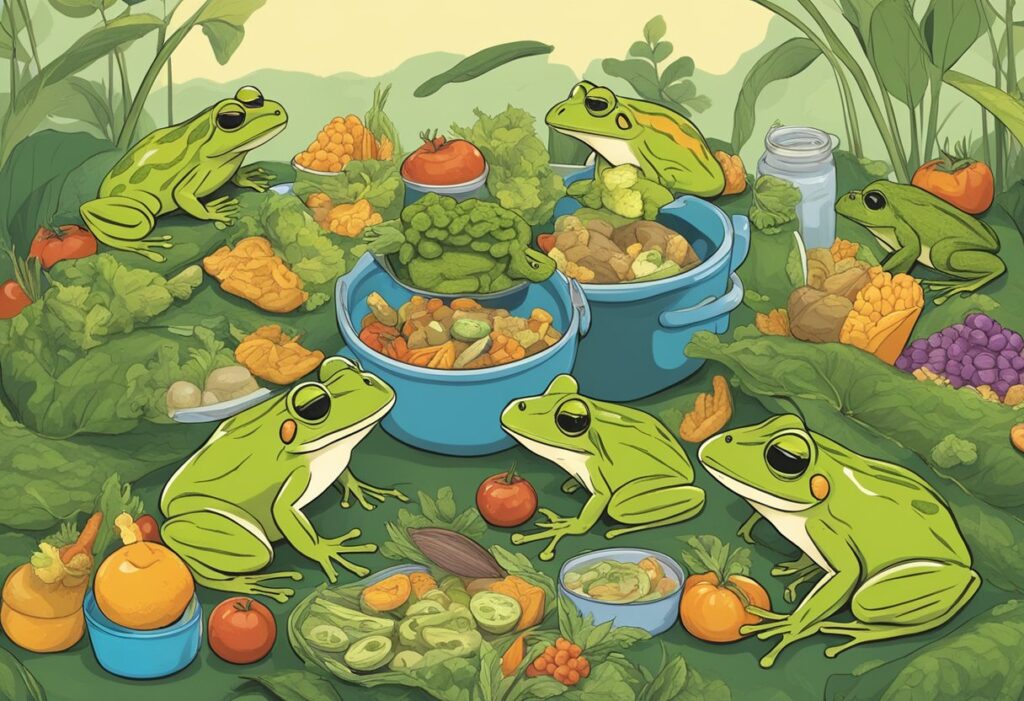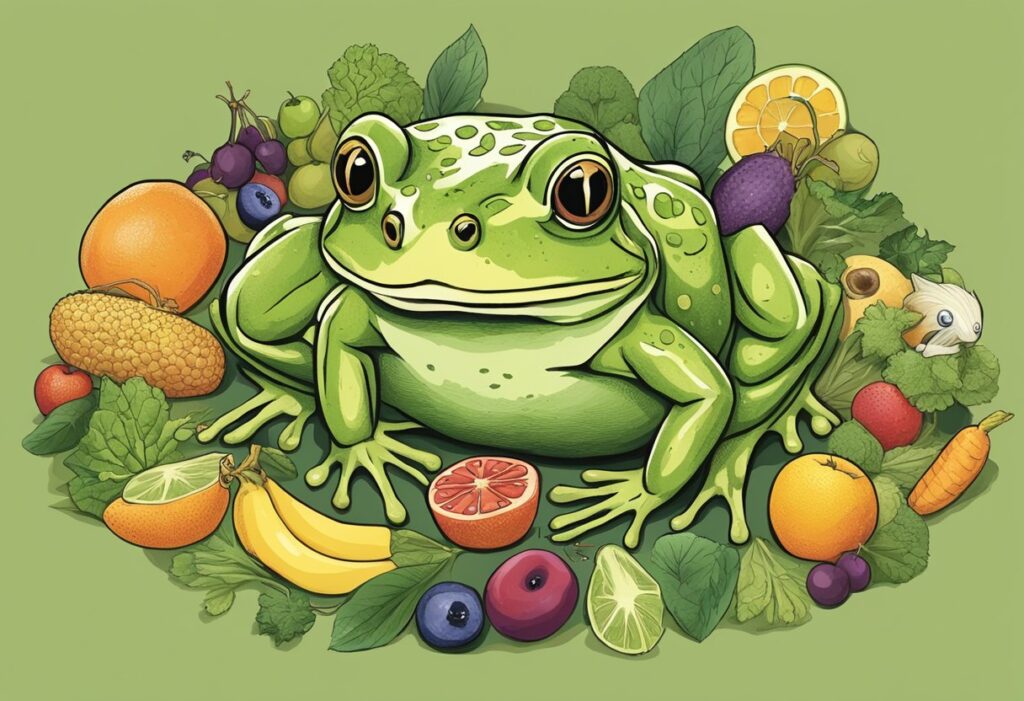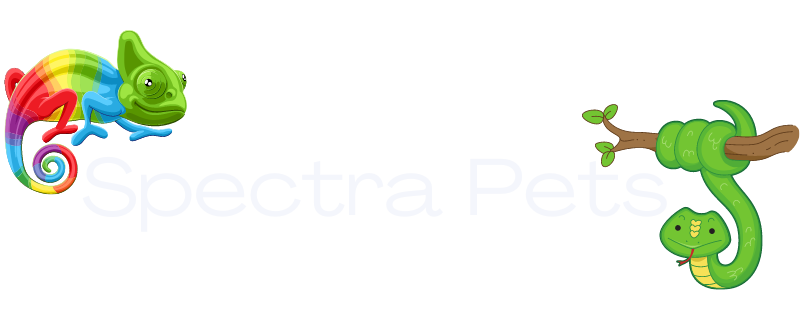Are you a frog owner wondering what human food you can feed your pet? It’s important to understand that frogs are obligate carnivores, which means they require a diet consisting of live animal-based prey. While they may eat tamed food like human food, vitamins, and supplements, they do not eat most human foods, especially fruits, seafood, or salty or sugary foods. In this article, we’ll cover safe human foods for frogs, feeding your pet frog, what to avoid feeding frogs, and special considerations for different frog species.

Understanding frog diets is crucial to providing proper nutrition for your pet. In the wild, frogs are carnivores and will eat insects, earthworms, caterpillars, beetles, crickets, grasshoppers, snails, slugs, spiders, and minnows. Frogs are opportunistic hunters and not picky eaters, so they will eat pretty much anything that will fit into their mouths. However, it’s important to note that not all insects are safe for frogs to eat, so it’s best to stick to feeding them insects that are known to be safe.
Key Takeaways
- Frogs are obligate carnivores and require a diet consisting of live animal-based prey.
- Safe human foods for frogs are limited, and it’s best to stick to feeding them insects that are known to be safe.
- It’s important to understand the dietary needs of your specific frog species to provide proper nutrition.
Understanding Frog Diets
Frogs are carnivores and their diets consist mainly of insects, worms, and arachnids. They are opportunistic hunters and will eat almost anything that fits into their mouths. However, it is important to understand their natural prey and predators, as well as their nutritional requirements, to ensure they receive a balanced and healthy diet.
Natural Prey and Predators
In the wild, frogs are preyed upon by many animals, including birds, snakes, and other frogs. As a result, they have evolved to be quick and agile hunters themselves, catching insects and other small prey. Some species of frogs, such as the African bullfrog, are known to eat larger prey, including small mammals and reptiles.
Nutritional Requirements
Frogs require a diet that is high in protein and other essential nutrients. In captivity, they can be fed a variety of live insects, including crickets, mealworms, and waxworms. It is important to provide a variety of insects to ensure they receive a balanced diet. Some species of frogs, such as the Pacman frog, can also be fed small rodents.
It is important to note that not all human foods are safe for frogs to eat. While some human foods, such as cooked chicken and fish, can be fed to frogs in moderation, others, such as chocolate and caffeine, can be toxic and should be avoided.
Safe Human Foods for Frogs
If you’re looking to add some variety to your frog’s diet, you may be wondering what human foods are safe for your amphibian friend to eat. While frogs are primarily carnivorous and require a diet of live insects and other small creatures, there are a few human foods that can be safely incorporated into their diet.

Fruits and Vegetables
Fruits and vegetables can be a great source of vitamins and minerals for your frog. Some safe options include:
- Apples
- Blueberries
- Grapes
- Mangoes
- Papayas
- Carrots
- Squash
- Green beans
It’s important to note that frogs have a difficult time digesting plant matter, so fruits and vegetables should only be given in small amounts as a supplement to their regular diet.
Proteins and Meat
Frogs require a diet high in protein, and while live insects are the best source of this nutrient, there are a few human foods that can be safely given in moderation. Some options include:
- Cooked chicken or turkey
- Boiled eggs
- Canned tuna in water
- Unseasoned cooked ground beef or pork
It’s important to avoid giving your frog any meat that has been seasoned with spices or herbs, as these can be harmful to their digestive system. Additionally, any meat given to your frog should be cooked thoroughly to avoid the risk of bacterial infection.
Feeding Your Pet Frog
Feeding your pet frog is an important aspect of keeping them healthy and happy. In this section, we’ll cover the feeding schedule and quantities, live prey feeding, and commercial frog foods.
Feeding Schedule and Quantities
Firstly, it’s important to establish a feeding schedule and stick to it. Most pet frogs should be fed every 2-3 days, but the frequency may vary depending on the species, age, and size of your frog. It’s recommended to feed your frog during the evening or night time, when they are most active.
When it comes to quantities, it’s best to feed your frog small meals that are appropriate for their size. Generally, the food offered should be smaller than the width of the frog’s mouth. Overfeeding can lead to obesity and other health issues, so it’s important to monitor your frog’s weight and adjust their diet accordingly.
Live Prey Feeding
Pet frogs should eat a varied diet of live insects, worms, and even small mammals (depending on the frog species being kept). Crickets, mealworms, and waxworms are commonly found in pet stores and make great food choices for your frog. Remember to always gut load the live prey using a nutritious diet before feeding them to your frog.
It’s important to never feed your frog wild-caught insects, as they may contain harmful pesticides or other toxins. Additionally, avoid feeding your frog insects that are too large, as they can cause choking or other digestive issues.
Commercial Frog Foods
Commercial frog foods are available in pet stores and can be used as a substitute for live prey. Pelleted frog foods are available but mainly for aquatic species, some aquatic turtle foods can be used as a substitute for frogs. However, it’s important to note that commercial foods should not be the only source of nutrition for your frog. They should be used as a supplement to a varied diet of live prey.
What to Avoid Feeding Frogs

Dangerous Foods and Substances
When it comes to feeding your frog, it is essential to know what foods to avoid. Certain foods can be toxic to frogs and can lead to illness or even death. Here are some of the dangerous foods and substances that you should avoid feeding your frog:
- Processed or Junk Food: Just like humans, frogs should not consume processed or junk food. These foods are often high in salt, sugar, and fat, which can be harmful to frogs. Avoid feeding your frog any type of processed or junk food, including chips, candy, and fast food.
- Dairy Products: Frogs are unable to digest dairy products, and they can cause digestive issues and even death. Avoid feeding your frog any type of dairy product, including milk, cheese, and yogurt.
- Fruits and Vegetables: While fruits and vegetables may seem like healthy options for your frog, they can be dangerous. Some fruits and vegetables are toxic to frogs, and others may cause digestive issues. Avoid feeding your frog any type of fruit or vegetable unless you have consulted with a veterinarian.
- Insects and Other Prey that Have Been Treated with Pesticides or Herbicides: Insects and other prey that have been treated with pesticides or herbicides can be toxic to frogs. Avoid feeding your frog any insects or other prey that have been treated with chemicals.
Common Feeding Mistakes
In addition to avoiding dangerous foods and substances, there are some common feeding mistakes that you should avoid when feeding your frog. Here are some of the most common feeding mistakes:
- Overfeeding: Overfeeding your frog can lead to obesity, which can cause health problems. Make sure to feed your frog the appropriate amount of food based on its size and species.
- Feeding Inappropriate Foods: Feeding your frog inappropriate foods can lead to digestive issues and even death. Make sure to research what foods are appropriate for your frog’s species and size before feeding it.
- Feeding Live Prey that is Too Large: Feeding your frog live prey that is too large can lead to choking and other health issues. Make sure to feed your frog prey that is appropriate for its size.
By avoiding dangerous foods and substances and common feeding mistakes, you can ensure that your frog stays healthy and happy. If you have any concerns about your frog’s diet, make sure to consult with a veterinarian.
Special Considerations for Frog Species
It’s important to understand that different species have different dietary needs. Here are some special considerations to keep in mind based on the type of frog you have:

Aquatic vs Terrestrial Frogs
Aquatic frogs, such as the African dwarf frog, primarily eat small aquatic invertebrates like brine shrimp, bloodworms, and blackworms. These types of frogs may also eat tadpoles or small fish. On the other hand, terrestrial frogs, like the American bullfrog, typically eat live insects such as crickets, mealworms, and waxworms.
Juvenile Frogs and Tadpoles
If you have a juvenile frog or tadpole, their diet will differ from that of an adult frog. Juvenile frogs and tadpoles require a diet that is high in protein and low in fat. They can be fed small aquatic invertebrates like daphnia and brine shrimp, as well as commercial tadpole food.
Exotic and Pet Frog Species
Exotic and pet frog species, like the Pacman frog, have unique dietary needs. These frogs are known to eat a variety of prey, including insects, small rodents, and even other frogs. It’s important to research the specific dietary needs of your exotic or pet frog species to ensure they are getting the proper nutrition. Additionally, it’s important to note that some pet stores may sell inappropriate foods for your frog. Always consult with a veterinarian or do your own research to ensure you are feeding your frog a healthy diet.
Overall, it’s important to remember that a frog’s diet varies based on their species and life stage. By understanding your frog’s dietary needs, you can ensure they are getting the proper nutrition to live a happy and healthy life.
Supplementation and Health
Frogs require a balanced diet to maintain optimal health. While their diet should primarily consist of insects and other small animals, it is possible to supplement their diet with certain human foods.
Vitamins and Calcium
Vitamins and minerals are essential for a frog’s health. Vitamin A is particularly important for maintaining healthy skin and eyesight. Calcium is also essential for strong bones and proper muscle function.
Some human foods that are high in vitamin A and calcium include sweet potatoes, carrots, spinach, kale, and broccoli. However, it’s important to note that frogs have different dietary requirements than humans, so it’s important to consult with a veterinarian before adding any new foods to their diet.
Monitoring Frog Health
It’s important to monitor your frog’s health closely, especially if you are supplementing their diet with human foods. Signs of poor health may include lethargy, loss of appetite, or changes in skin color.
To ensure your frog stays healthy, make sure they have access to clean water and an appropriate diet. It’s also important to provide them with adequate lighting and temperature control.
Remember, while it is possible to supplement a frog’s diet with certain human foods, it’s important to do so in moderation and with caution. Always consult with a veterinarian before making any changes to your frog’s diet or care routine.
Frequently Asked Questions

Can our green buddies munch on fruits like we do?
While frogs are primarily insectivores, some species of frogs can eat fruits in small amounts. However, it’s essential to remember that their digestive system is not designed to handle a diet that is primarily composed of fruits. As a result, feeding them fruits should be limited and only given as a treat.
Frogs can eat some vegetables, but it’s crucial to know which ones are safe and which ones are not. Vegetables like lettuce, cucumber, and zucchini are safe for frogs to eat, but it’s best to avoid feeding them onions, garlic, and avocados, as they can be toxic to frogs.
Are insects the only snack for frogs, or can they diversify their palate?
Insects are the primary food source for most species of frogs, but they are not the only snack for our amphibian friends. Frogs can also eat small fish, earthworms, snails, and slugs. It’s essential to ensure that the food provided is appropriately sized for the frog, as they can only eat prey that fits in their mouth.
Bread is not a suitable food for frogs. It doesn’t provide the necessary nutrients that frogs need to stay healthy, and it can also cause digestive problems. It’s best to stick to a diet of insects, small fish, and other small prey that is appropriate for the frog’s size.
What’s on the ‘no-go’ list for froggy feasts?
Some foods are not suitable for frogs and can even be toxic. Foods to avoid include chocolate, caffeine, dairy products, and fatty foods. It’s also essential to avoid feeding frogs insects that have been exposed to pesticides or other chemicals.
Do frogs enjoy a chicken treat or should we steer clear?
Frogs are not designed to eat meat, and it’s not recommended to feed them chicken or any other type of meat. Stick to a diet of insects, small fish, and other small prey that is appropriate for their size and nutritional needs.
Remember, when feeding your frog, it’s essential to provide a varied diet that meets their nutritional needs. Always research the specific dietary requirements of your frog’s species and consult with a veterinarian if you have any concerns about their diet.

